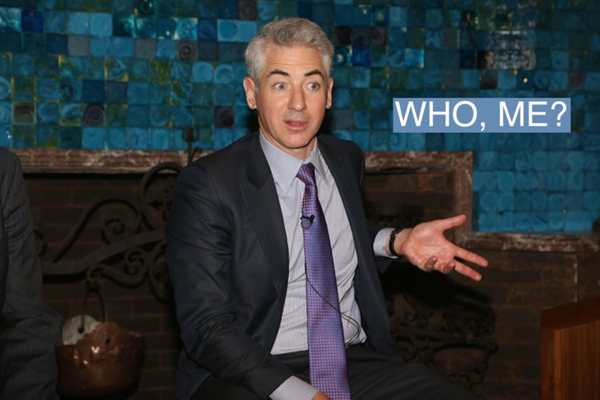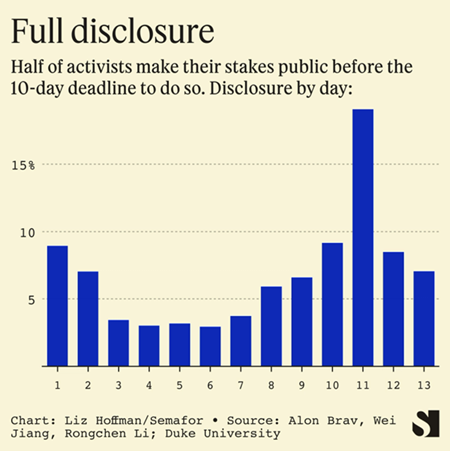|
SEMAFOR
Liz Hoffman |
 |
A win for
corporate raiders
Updated Jan 3, 2023, 1:26pm EST
※ THE
SCOOP
U.S. rules
governing how activist hedge funds and hostile bidders can accumulate
stock positions in secret haven’t been meaningfully changed since
1968.
Now, the
Securities and Exchange Commission is finalizing reforms and likely to
back off its most far-reaching proposals, people familiar with the
matter said. That retreat would hand a win to investors like Bill
Ackman and Carl Icahn, and their brokers on Wall Street.
|

Getty
Images/Sylvain Gaboury |
At issue are rules
on when and how investors have to disclose stakes of at least 5%,
which have been used to push for changes at some of America’s
corporate giants. The agency’s proposal to narrow the deadline for
investors to publicly report their stake, from 10 days to five, is
likely to survive in the final measures, people familiar with the
matter said.
But two other
major rule revisions the SEC proposed in March are likely to be
abandoned or significantly pared back after feedback from market
players.
One would sweep
stock contracts with Wall Street banks – which mimic exposure to stock
ownership but don’t carry the right to buy the underlying shares –
into an investors’ stake for purposes of calculating the 5% trigger.
That proposal would also rope those banks into a hedge fund’s camp for
purposes of determining whether an investor “group” had been formed.
This fall, the two
camps made their case directly to the SEC, people familiar with the
matter said. Wachtell, Lipton, the staunchly pro-management law firm,
sent two heavyweight lawyers, David Katz and Leo Strine, to lobby the
SEC for tighter rules. Stephen Fraidin of Cadwalader, Wickersham &
Taft LLP and Berkeley Law’s Frank Partnoy went to argue the case of
activists.
No decisions have
been made, and the SEC could choose to re-propose preliminary rules
for a new round of comments from the public. A final rule is expected
sometime this summer, the people said.
☼ LIZ'S
VIEW
The
investing world moves faster than it did in 1968, and the speed with
which market information moves means the SEC can tighten the 10-day
window and still keep the balance between investors, who need an
incentive to make bold bets, and the rights of corporate managers they
target not to be blindsided.
Most activists don’t even use the full 10 days to build their stakes.
Even one of the biggest activist hedge funds, Elliott, isn’t
opposing that move.
But
the SEC’s other proposals would hamstring activists’ ability to use
common trading strategies, like swaps, that boost their economics but
not their strongarm power. And they would make it impossible for most
banks to work with activists, who can play constructive roles in
shaking up entrenched management or calling out poor performance.
Take the swaps rule. Hedge funds use swaps contracts, which are
cheaper than outright share purchases, to boost their economic
ownership in companies but don’t give an activist any additional
votes. The contracts require investment banks to deliver the cash
value of the stock in the future, so they go out and buy the
underlying shares. The SEC’s proposal would include those swaps in
the investor’s position for purposes of triggering the 5% threshold.
The
proposed rule would also require that a bank disclose every
transaction it made in the shares in issue – an insane requirement for
a large Wall Street brokerage desk, which might trade thousands of
individual stocks in any given day.
And
if the SEC really wants to breathe some life back into the 13D rules,
it could start by sanctioning Elon Musk for flagrantly violating them
in his pursuit last spring of Twitter. He blew the filing deadline; trading
records show he owned 5% of the company by March 14, but he
didn’t make his first filing until three weeks later.
And
even then, he disclosed his stake on a form reserved
for passive investors who don’t plan to seek control of the company or
influence its board. By that point, Musk had unleashed a string of
tweets criticizing the company’s management and had talked
to Twitter about joining its board for weeks.
▒ ROOM
FOR DISAGREEMENT
Supporters of the
rule argue the swaps market does need more transparency, and cite the
swift collapse in 2021 of Archegos Capital Management. The fund had
built up huge positions in Viacom, Shopify and other stocks through
shadowy swaps trades, in some cases equivalent to 50% or more of the
float – all without having to make so much as a single disclosure.
When the stocks
fell, it started a swift collapse that ultimately cost the banks
Archegos was doing business with $10 billion. “This combination of
leverage and anonymity proved devastating,” Wall Street nonprofit
watchdog Better Markets wrote to the SEC in support of the changes.
Six Democratic
senators, including Elizabeth Warren and Sherrod Brown, have made the
same point. They argue the changes are needed “to ensure that [swaps]
are not used to hide a stake in [a] public company or a large position
that could destabilize financial markets.”
◙ NOTABLE
-
WSJ on how Archegos’ blow-up renewed
calls for more transparency in swaps. “The private
marketplace was not aware of the extent of the risk exposure,
because it did not have enough information,” one expert told the
paper. “The antidote for that is more disclosure.”
-
A paper commissioned
by a group of investors dove back into the congressional record to
untangle the origins of the Williams Act, and argues that no reforms
are needed.
© 2023 SEMAFOR INC. |


